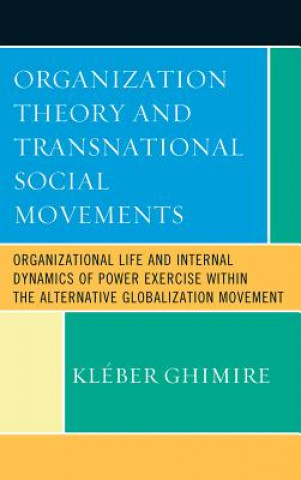
Code: 04903726
Organization Theory and Transnational Social Movements
by Kleber Bertrand Ghimire
Placing it within the theoretical perspectives and debates in Organizational Theory (OT), this book explores the organizational design and internal functioning of a rather emblematic and widely acclaimed transnational social organ ... more
- Language:
 English
English - Binding: Hardback
- Number of pages: 178
Publisher: Lexington Books, 2011
- More about this

138.69 €

Low in stock at our supplier
Shipping in 10 - 15 days
Potřebujete více kusů?Máte-li zájem o více kusů, prověřte, prosím, nejprve dostupnost titulu na naši zákaznické podpoře.
Add to wishlist
You might also like
-

Quantum Electrodynamics
82.94 € -

Oxford Handbook of Business Ethics
73.12 € -

Psychotherapy with Sexually Abused Boys
108.10 € -

Dan Ge Performance
26.99 € -

No Statue on the Courthouse Lawn
17.99 € -19 % -

Mastering Money: Creating the Money You Want, From the Inside, Out
9.20 € -2 % -

Nomad Trader
20.86 € -2 %
Give this book as a present today
- Order book and choose Gift Order.
- We will send you book gift voucher at once. You can give it out to anyone.
- Book will be send to donee, nothing more to care about.
More about Organization Theory and Transnational Social Movements
You get 343 loyalty points
 Book synopsis
Book synopsis
Placing it within the theoretical perspectives and debates in Organizational Theory (OT), this book explores the organizational design and internal functioning of a rather emblematic and widely acclaimed transnational social organization: the alternative globalization movement (previously anti-globalization movement). The issue of power in particular remains the central feature of the book. Based on a detailed study of two of the movement's essential constituents (transnational campaigns and the World Social Forum), the book examines the complexity in which certain forms of internal relations or mechanisms of power emerge. In other words, how is the organizational hierarchy conceived and how are important responsibilities executed? What are the principal modes of authority and control? What are the priorities and motives of the leading individuals and groups within the movement? Furthermore, what makes certain echelons, groups, or individuals wield more influence and authority than others, and also justify their legitimacy through diverse means? These questions are especially valid owing to the movement's proper interpretation of power which considers the concentration of power as totally unacceptable. The movement draws lessons from the history of social changes to suggest that political parties and labour movements tended to give rise to the seizure of power by a few, a heavy bureaucracy, and the lack of transparency. Logically, then, a new organizational vision should emerge, avoiding hierarchies and encouraging a more diffused process of power sharing. However, an informal manner of functioning has instead created many ambiguities, with new sets of interests and power relations gradually becoming manifest within the movement. All carefully considered, the book draws three principal conclusions: first, an informal organization structure does not mean that there is an absence of power; second, the exercise of power takes place while denying it; and third, there is seemingly a lack of internal resistanc
 Book details
Book details
Book category Books in English Society & social sciences Society & culture: general Social issues & processes
138.69 €
- Full title: Organization Theory and Transnational Social Movements
- Subtitle: Organizational Life and Internal Dynamics of Power Exercise within the Alternative Globalization Movement
- Author: Kleber Bertrand Ghimire
- Language:
 English
English - Binding: Hardback
- Number of pages: 178
- EAN: 9780739165577
- ISBN: 0739165577
- ID: 04903726
- Publisher: Lexington Books
- Weight: 422 g
- Dimensions: 235 × 156 × 17 mm
- Date of publishing: 08. April 2011
Trending among others
-

Singularity Is Near
22.90 € -16 % -

Spirit of Camphill
17.68 € -18 % -

Men Explain Things to Me
12.26 € -29 % -

The Second Sex
7.15 € -25 % -

Pleasure Activism
16.15 € -24 % -

The Next 100 Years
13.80 € -26 % -

The Lucifer Effect
15.84 € -24 % -

Silently Seduced
11.65 € -29 % -

Superforecasting
10.93 € -24 % -

Sorry I'm Late, I Didn't Want to Come
11.04 € -23 % -

Poor Economics
11.04 € -23 % -

Regarding the Pain of Others
12.26 € -23 % -

Sensate Focus in Sex Therapy
39.16 € -5 % -

The Divide
11.96 € -17 % -

Food Of The Gods
15.43 € -28 % -

Toxic Parents
14.41 € -23 % -

White Tears Brown Scars
10.12 € -25 % -

Future Shock
8.99 € -22 % -

Drama Of Being A Child
11.14 € -23 % -

Presence
14.62 € -24 % -

Violence
13.08 € -18 % -

Shock Doctrine
14.92 € -25 % -

Your Silence Will Not Protect You
14.41 € -28 % -

Feminism, Interrupted
13.59 € -

Social Animal
12.26 € -29 % -

Life at the Bottom
14 € -23 % -

Aquarian Conspiracy
19.42 € -23 % -

Addiction by Design
29.55 € -17 % -

Rational Recovery
15.23 € -25 % -

Story of My Life
6.02 € -1 % -

We Should All Be Feminists
9.40 € -18 % -

Second Sex
23.41 € -18 % -

Bold
13.80 € -28 % -

Development as Freedom
15.84 € -21 % -

Sociological Imagination
15.43 € -28 % -

Globalization and Its Discontents Revisited
15.64 € -19 % -

Conflict Is Not Abuse
17.48 € -18 % -

Another Forgotten Child
9.40 € -28 % -

Globalization and Its Discontents Revisited
13.49 € -28 % -

Girl Alone
10.42 € -28 % -

Wasted
11.14 € -23 % -

Miami
11.45 € -28 % -

Prey
31.19 € -

Lipitor
14.51 € -22 % -

Cultural Literacy
24.74 € -21 % -

Innovations in Deaf Studies: The Role of Deaf Scholars
136.33 € -

Free from Lies
19.32 € -20 % -

Invisible Women of Prehistory
30.78 € -1 % -

Captive
24.33 € -17 %
Collection points Bratislava a 2642 dalších
Copyright ©2008-24 najlacnejsie-knihy.sk All rights reservedPrivacyCookies


 15549 collection points
15549 collection points Delivery 2.99 €
Delivery 2.99 € 02/210 210 99 (8-15.30h)
02/210 210 99 (8-15.30h)